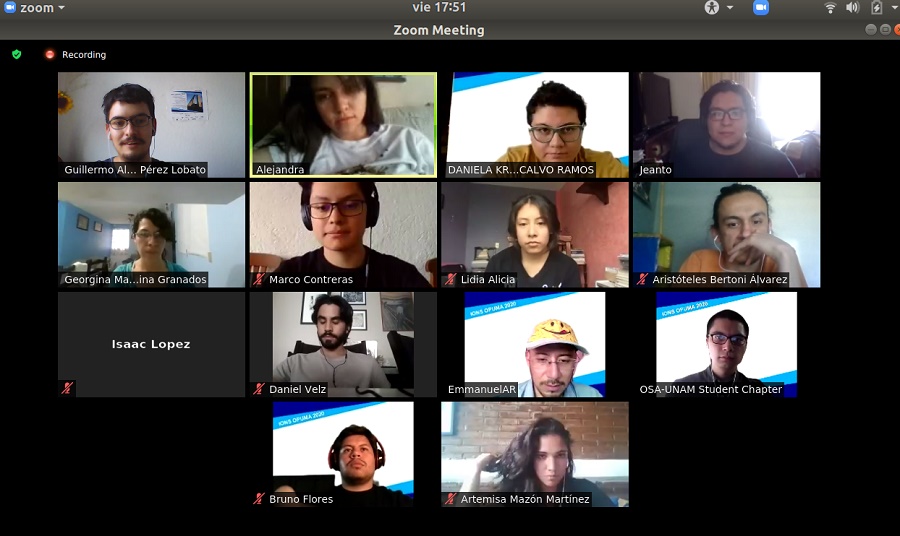IONS OPUMA 2020: First online IONS conference retrospective
IONS OPUMA 2020: First online IONS conference retrospective
Guillermo Alejandro Pérez Lobato & OSA Student Members, OSA-UNAM Student Chapter
The IONS OPUMA 2020 conference, held 8 – 12 June 2020, was the first online student run conference sponsored by The Optical Society (OSA). Being the first online IONS was not a decision taken out of curiosity, but an initiative taken in response to the crisis of the Covid-19 global pandemic. Having spent over a year planning the in-person conference, we had almost everything ready to make it a reality.
Seeing the economic and health panorama of next year becoming clearer by the day, we realized that postponing the conference could mean that we lose some of the technical excellence we had mustered for this event. It was then that we decided to look for another option.
Around this time, many other conferences were changing to an online format. There were also precedents for these experiences: The POM (Photonics Online Meetup) that happened in January was perhaps the first, and soon followed by CLEO 2020, which many of us had the opportunity to attend for the first time thanks to the all-virtual format and free registration.

Caption: Participants during the all-virtual 2020 IONS OPUMA conference
Credit: Guillermo Alejandro Pérez Lobato, OSA Student Member, OSA-UNAM Student Chapter
Empowered by reading the material about the POM and attending the CLEO, we set out to organize our very own online conference.
During the 5 days of the conference, we had 9 plenary lectures, industry sessions, a gender inclusion discussion session, professional development sessions where we talked with the researchers on how to further our careers, online poster sessions on a dedicated Facebook group, graduate program presentation sessions, a student chapter competition, and more. It was quite an eventful and exhausting experience.
We had over 315 participants, from all over the world. About one-third of the participants, plenary lecturers, and organizing committee members were women: a reflection of the lack of gender parity in science and technology.
After the conference concluded, it is interesting to note that the greatest challenges were surprisingly familiar: Effective communication and clarity on teamwork procedures (who is responsible to fix what?). Our advice on the most important points to carry out an online student conference successfully are the following:
- Create a plan for conducting an online conference from day 1 in addition to planning an in-person conference. We had the plan to do an in person conference, so changing the entire structure was exhausting and not ideal.
- Building on point 1, we suggest having a horizontal power structure, where each officer has decision-making power and is responsible for the decisions of their group of volunteers. This works better for an online conference format because everyone is constantly in the conference all at once.
- Have the objectives of your conference clear, and choose your platforms accordingly. You will need platforms that can broadcast information, and a video platform for the plenary lectures. We chose Zoom for the latter, and Facebook for the former.
- Practice all functionalities of the platforms you will be using. Train your team on the functions they will need to use. We suggest holding a “dress rehearsal” before the conference to identify problems before the conference begins. Practice makes perfect!
In conclusion, we hope to see more student led online conferences. Hope these points help you organize your own successful all-virtual event.
